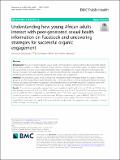Understanding how young African adults interact with peer-generated sexual health information on Facebook and uncovering strategies for successful organic engagement
Abstract
Background The use of social media for sexual health communication is gaining intense discussion both globally and in Africa. Despite this reality, it remains unclear whether and how young African adults use digital innovations like social media to access sexual health information. More importantly, the unique properties of messages that increase message reach and propagation are not well understood. This study aims to fill the gaps in scholarship by identifying post features and content associated with greater user engagement. Methods We analyzed a corpus of 3533 sexual and reproductive health messages shared on a public Facebook group by and for young African adults between June 1, 2018, and May 31, 2019, to understand better the unique features associated with higher engagement with peer-generated sexual health education. Facebook posts were independently classified into thematic categories such as topic, strategy, and tone of communication. Results The participants generally engaged with posts superficially by liking (x̃ = 54; x̄ = 109.28; σ = 159.24) rather than leaving comments (x̃ = 10; x̄ = 32.03; σ = 62.65) or sharing (x̃ = 3; x̄ = 11.34; σ = 55.12) the wallposts. Messages with fear [IRR:0.75, 95% CI: 0.66–0.86] or guilt [IRR:0.82, 95% CI: 0.72–0.92] appeals received a significantly lower number of reactions compared to neutral messages. Messages requesting an opinion [IRR:4.25, 95% CI: 3.57–5.10] had a significantly higher number of comments compared to status updates. The use of multimedia and storytelling formats were also significantly associated with a higher level of engagement and propagation of sexual health messages on the group. Conclusion Young adults in our sample tend to superficially interact with peer-communicated sexual health information through likes than engage (comments) or propagate such messages. Message features that increase engagements and propagation of messages include multimedia and engaging styles like storytelling. Our findings provide valuable insight and pave the way for the design of effective and context-specific sexual health information use of features that attract young African adults.
Citation
Olamijuwon , E , Clifford , O & Adjiwanou , V 2021 , ' Understanding how young African adults interact with peer-generated sexual health information on Facebook and uncovering strategies for successful organic engagement ' , BMC Public Health , vol. 21 , 2153 . https://doi.org/10.1186/s12889-021-12165-x
Publication
BMC Public Health
Status
Peer reviewed
ISSN
1471-2458Type
Journal article
Description
EO acknowledges partial funding from the Southern Africa Systems Analysis Centre (SASAC) and the University of the Witwatersrand to support this study which forms part of a graduate thesis on “Advancing Sexual Health Education Strategies for Young African Adults in the Digital Age”.Collections
Items in the St Andrews Research Repository are protected by copyright, with all rights reserved, unless otherwise indicated.

